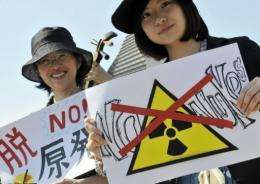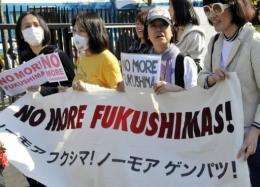Thousands march against nuclear power in Japan

Thousands of people marched in Tokyo on Sunday to demand an end to nuclear power in Japan and a switch to alternative energy after the crisis at an atomic plant hit by the March 11 earthquake and tsunami.
Brandishing placards bearing the slogan: "Bye Bye Genpatsu" (Goodbye Nuclear Power), demonstrators -- including many young people and families -- walked along a route from Yoyogi Park in the centre of the capital.
Organisers estimated 5,000 took part.
"We are worried. Before Fukushima, I wasn't thinking about it but now we must act, we must do it for our children," said Hiroshi Iino, 43, who joined the "Energy shift parade" with his wife and two boys, aged five and nine.
Schoolteacher Yoko Onuma, 48, said she was demonstrating for the second time since the accident at the Fukushima Daiichi plant where radiation leaks have forced the evacuation of some 80,000 people within 20 kilometres (13 miles) of the site.
"Before, I wasn't aware of the dangers of nuclear power," she said.
"But now we have to mobilise many people, as has happened in other countries, such as Germany."

Greenpeace Japan director Junichi Sato, one of the organisers of the protest, said until now few had protested about nuclear power following the quake-tsunami disaster which left more than 26,000 dead or missing.
"Over the past month, everybody was focusing on the victims of the tsunami ... on how to end the crisis," Sato said.
"Outside (in other countries), they jumped directly on the energy issue," he said. "But mobilisation is going to increase in Japan."
Around 2,000 people took part in a separate anti-nuclear demonstration under the slogan "Anti-TEPCO," referring to the operator of the atomic plant, held simultaneously a few kilometres away at Shiba Park.
The issue of possibly phasing out nuclear power is now openly debated on the political scene in Japan.
"We cannot do without nuclear energy, but we have to think about the way nuclear plants are built and the speed of their construction," Katsuya Okada, secretary general of the ruling centre-left Democratic Party of Japan, said Friday.
Before the tsunami which led to the shutdown of a dozen reactors, nearly 30 percent of Japan's electricity was generated from nuclear power.
Resource-poor Japan is highly dependent on Middle Eastern oil but its high-tech companies are also world leaders in many environmental and energy-saving technologies.
(c) 2011 AFP





















